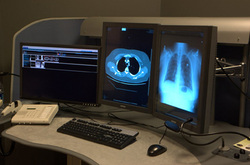|
The following was originally published at dailylocal.com on Monday, March 11th, 2013 by Dr. Alicia McKelvey. Dr. McKelvey is a thoracic surgeon on staff at Paoli Hospital in Chester County, PA.  Lung cancer is the leading cause of cancer death in the US. In fact, more people die of lung cancer than of colon, breast and prostate cancers combined. Screening for colon, breast and prostate cancer have played a significant role in reducing the number of deaths due to these diseases. Until recently, however, no screening test for lung cancer has proven effective in detecting the disease at an early, more treatable stage. In August 2011, the National Lung Screening Trial, sponsored by the National Cancer Institute, released findings from the first scientific study of an effective screening technique using advanced imaging technology called the low dose helical CT scan (LDHCT) that significantly reduces death due to lung cancer in high risk individuals. This study demonstrated 20 percent fewer lung cancer deaths in those who underwent screening with LDHCT as compared with those who were screened with standard chest x-rays. High risk individuals are those who are 55 to 74 years old and who have a 30 or more pack year smoking history and former smokers who quit within the last 15 years. Pack years is a term used to categorize smoking history and is calculated by the number of packs smoked each day times the years of smoking. Screening with the low-dose CT scan enabled the detection of lung cancer at its earliest stage when there are typically no symptoms to indicate a problem. Early stage lung cancer means the disease has not spread to other organs or to lymph nodes. Knowing the stage along with other factors, including the type of cancer and the patient’s overall health, helps doctors to recommend the best treatment. Treatment options for lung cancer include surgery, radiation, chemotherapy or any combination of these therapies. The typical course for early stage lung cancer is surgery to remove the diseased tissue. If concerned about lung cancer, contact a physician to discuss ways to reduce the risk and whether screening with a LDHCT is beneficial.
0 Comments
Your comment will be posted after it is approved.
Leave a Reply. |
Details
|


 RSS Feed
RSS Feed
